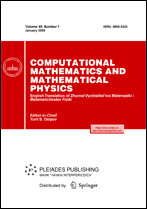|
This article is cited in 5 scientific papers (total in 5 papers)
Gaussian functions combined with Kolmogorov's theorem as applied to approximation of functions of several variables
A. V. Chernovab
a Nizhny Novgorod State University, Nizhny Novgorod, 603950 Russia
b Nizhny Novgorod State Technical University, Nizhny Novgorod, 603950 Russia
Abstract:
A special class of approximations of continuous functions of several variables on the unit coordinate cube is investigated. The class is constructed using Kolmogorov's theorem stating that functions of the indicated type can be represented as a finite superposition of continuous single-variable functions and another result on the approximation of such functions by linear combinations of quadratic exponentials (also known as Gaussian functions). The effectiveness of such a representation is based on the author's previously proved assertion that the Mexican hat mother wavelet on any fixed bounded interval can be approximated as accurately as desired by a linear combination of two Gaussian functions. It is proved that the class of approximations under study is dense everywhere in the class of continuous multivariable functions on the coordinate cube. For the case of continuous functions of two variables, numerical results are presented that confirm the effectiveness of approximations of the studied class.
Key words:
approximation of continuous functions of several variables, Gaussian functions, quadratic exponentials, Kolmogorov's theorem.
Received: 04.02.2019
Revised: 11.11.2019
Accepted: 14.01.2020
Citation:
A. V. Chernov, “Gaussian functions combined with Kolmogorov's theorem as applied to approximation of functions of several variables”, Zh. Vychisl. Mat. Mat. Fiz., 60:5 (2020), 784–801; Comput. Math. Math. Phys., 60:5 (2020), 766–782
Linking options:
https://www.mathnet.ru/eng/zvmmf11074 https://www.mathnet.ru/eng/zvmmf/v60/i5/p784
|


| Statistics & downloads: |
| Abstract page: | 196 | | References: | 24 |
|





 Contact us:
Contact us: Terms of Use
Terms of Use
 Registration to the website
Registration to the website Logotypes
Logotypes








 Citation in format
Citation in format 
